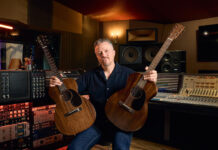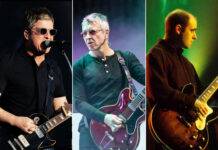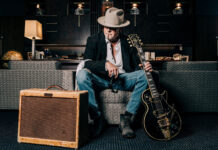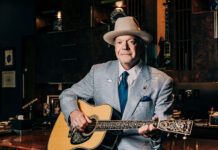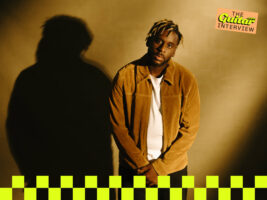
Folk-pop star Myles Smith on how playing guitar made him feel seen, the importance of open mic nights and the ‘double-edged sword’ of going viral
“It’s definitely not what a young lad from Luton expected…” says singer-songwriter and guitarist Myles Smith, who had a breakthrough year in 2024. While there are many things he could be referring to – performing on Jimmy Kimmel in America, clocking up hundreds of millions of streams, going viral several times and being tipped as a one to watch by tastemakers and music media – he’s actually talking about performing a concert in Fortnite.
“It was crazy,” he adds, having spent several days dressed up “like a virtual tree”; putting up with the unusual costume was the right move, as the gig was streamed out to a community of millions of players. “It lived on their server for a few weeks and I think it was their top one for quite a while,” Smith says proudly. “To be able to be part of a game that I think we all played during lockdown, and just to see myself in that way, and to be able to perform my music in such a new way was amazing.”
READ MORE: Mark Tremonti on collecting amps, the importance of improvisation, and being the busiest man in rock
Undoubtedly, he’s come a very long way over the past 12 months, but Smith’s rise from open-mic nights to viral sensation is no overnight success story. Having taught himself to play the guitar at just nine-years-old by reading books and watching YouTube tutorials, he quickly “fell in love with it. It was an instrument that just called my name,” he says, recalling that his mum said he needed to teach himself a little bit before she would get him lessons. Smith thinks this was an understandable approach: “I’d exhausted every other hobby that you could think of, so by the time I got round to the guitar, she was like ‘I’m done – you need to try a little bit to commit’.”
Thankfully, Smith did, and his persistence paid off. Within the first few weeks, a young Myles was playing songs and getting familiar with the instrument. “I think it was the first thing that I really felt comfortable with and that truly felt like me,” he recalls, adding that he gravitated towards guitar-led music, particularly rock and indie. Seeing frontmen and singers holding guitars ignited his passion further. “I remember thinking ‘I really want to be like that’,” he says, citing musicians like Billy Joel Armstrong (“I was a huge Green Day fan”), Coldplay, Ed Sheeran and Mumford & Sons. “I just loved watching them,” he remembers.
Going to gigs at venues in Luton and seeing unknown local bands and artists made Smith “fall in love with music” even more. “It wasn’t by going down to The O2, though,” he attests; rather, he and some mates would go to their local. Around that time, he was starting to perform at open-mic nights, which gave him a real grounding. “They were a big part of who I am today and how I got here,” Smith recalls – “that’s where I first cut my teeth.”
Image: Jennifer McCord
These formative gigs also gave him a glimpse into the reality of the music industry. “Nothing gets you more prepared for the world of music than having to convince a 50-year-old man holding a pint of Guinness that you’re the next best thing,” he laughs of the tougher shows he played; “a 13-year-old with his voice semi-breaking is not what you want to hear when you’ve finally caught a break from work”. Nonetheless, Smith would always win them over by the end: “having people up and dancing and singing and clapping made it all the better.”
Completing the circuit by his early teens, Smith had built up “a real grit and resilience, but also an appreciation for just playing in front of a bunch of strangers”. He feels that such events were pivotal for his development, and still are for aspiring artists in their early days. “Though they seem small and meaningless to so many, for someone trying to make it, open mic nights are so important to build your skill set,” he considers. “Because when it does happen to you further down the line, you’re ready to go.”
This undoubtedly aided Smith, who finally got his big break after uploading cover versions to the internet post-pandemic. “I was never really online before that because I didn’t quite see my place there,” he recalls. However, witnessing the line between the everyday person and celebrities and singers get closer changed his perception: “I never saw myself as this all-singing, all-dancing, all acting superstar, but when other artists started to come through that were more relatable and more human, I think that helped me understand social media a little bit better.”
The passage of time, and changing trends, worked in Smith’s favour: “I’m not this unreachable thing,” he says. “I’m just a guy who shared his music with the world.” Though he always hoped his songs would find a community, Smith didn’t anticipate having fans all around the world. “I could never have anticipated it, especially this quick,” he says of his viral successes. “The first time, it was such a shock and surprise,” he recalls of the reaction to his rendition of The Neighbourhood’s Sweater Weather. But when it happened again (and again) – for his own singles – he came to a realisation. “The chase of going viral is like a double-edged sword,” he suggests, “because either you get there and then you’re like, ‘okay, why did I want to get here so bad?’ or you don’t get there and you feel terrible and think that your music is awful.”
Staying independent during the early days of his rise on TikTok helped him to stay grounded. “That was always conscious and intentional,” he says. “I didn’t ever want to go to a major label without fully knowing who I was, what I wanted to be, and how I wanted to present myself to the world,” he reflects. When Myles did sign a deal – with RCA, in early 2024 – he was 25-years-old and had spent much of his life trying to make a name for himself. “I had a lot of grasp of who I was as a person, as an artist, and so I wasn’t comfortable doing anything before that point,” he says.
Having built an audience of several million monthly listeners and “known exactly the direction I wanted to go in”, he felt ready to have a team come on board and “help me to bring that on a wider scale”. Perhaps expectedly, Smith says he’s no longer chasing hits: “stepping away from being led by virality has probably been the healthiest move for me, but it’s also helped me to develop as an artist and understand that it’s not the be all and end all of great music.”
Image: Jennifer McCord
Aside from his untainted DIY spirit, there’s no denying that his fusion of soul-baring lyricism, warm vocals and stirring guitar riffs are what have helped his euphoric songs to resonate with so many people across the globe. With listening to his intimate, tender anthems Solo, My Home and Stargazing carrying the same feeling as hugging a friend, it’s no surprise to learn that “every single day” Smith is being told how his music has impacted someone. “I think the reason my music has connected is because it’s real and it’s from a place of authenticity,” he says, adding that “honest storytelling” is how he has always related to music.
Recently, much of his songwriting inspiration has followed “really intense” periods of touring or working where he then blocks out several weeks to focus on making music. “I’ll do a lot by myself, but also a lot with friends,” he says of his creative process. “I reflect on whatever happened in the months prior or whatever parts of my life or history have come to the top of my mind that I urgently want to say something about.” Not putting out music for the sake of it is an ethos that Smith has always followed. “I feel like I only write songs when I have something to say or when I have something meaningful to contribute to the world, then they have become a nice snapshot of where I’m at at the time.”
More than this, encouraging others to pursue their passion has been fulfilling for Smith on a personal level. “Having a generation of youth who look and sound like me say ‘you inspired me to pick up a guitar’ or ‘you inspired me to listen to music outside of what I usually listen to’ is so inspiring.” Hearing these stories has been both a rewarding and inspiring experience: “it has had an impact on me moving forward in terms of what I want to do, and what I want to represent.”
While he has enjoyed seeing folk and country music have mainstream moments in 2024 – “I think it’s really cool and exciting” – he doesn’t want to be pigeonholed. “It’s nice that I’m being recognised and that my music’s going far and wide, but I also never want to box myself into one category,” he says. “It’s about treading the line of accepting and embracing the music that I make and the things I love to do, but also letting people know that there are many angles and different shades of what I do.”
Keen to experiment with different genres in the future, Myles says, “I think everything that’s influenced me growing up at some point manifests itself in the music I make, but I don’t necessarily walk into a session and say ‘hey, I’m gonna make a rock song’. Sometimes I walk out of a session with such surprise about what I’ve created though, and I’m like ‘oh, this is really awesome’.” Like the musicians he grew up listening to, he wants every project, EP or single to demonstrate an evolution or difference; “they have always found new ways to present their music, and following their journey has been interesting.”
One of those is James Bay, who he collaborated with on last year’s A Minute… EP. Looking ahead, Smith has a bucket list full of dream collaborators: “I’d love to have a song with Ed, one with Mumford & Sons, and Noah Kahan.” Believing that “the most beautiful music is made through collaboration”, he says he’ll “work with anyone and everyone”, especially because some of his favourite songs are collabs, including Paramore and B.o.B’s Airplanes. “They’re like a soundtrack to a lifetime, so if I could be part of a cultural moment at some point in my future, that’d be awesome.”
Image: Jennifer McCord
Smith also hopes that he will continue to inspire others to pick up a guitar and start writing songs. “Stop thinking about picking it up, stop thinking about going to that shop, or stop thinking about maybe starting tomorrow, just do it,” he offers as advice for aspiring musicians. “Everything seems hard before you give it a go and when you realise it’s simple, you’ll be so thankful that you tried.”
Looking ahead to his plans for this year, he’s gearing up for a headline UK tour. “It’s a proper show,” he says; “as opposed to coming to a gig and me playing my songs, you’ll be coming to a show. I think it’s the first time I can truly call it a show, because it’s a production, it’s a lot of moving parts and pieces to make it all come together. I feel super proud of it and am excited to show my music off, finally, in the way in which it was intended.”
As for his goals for the future, Smith’s ambitions are refreshingly humble: “it always comes back to me wanting to let people know that it’s okay to show how they’re feeling and not to be ashamed or scared – for them to be unequivocally themselves in everything that they do and present. That’s always going to be the core of my music.”
The post Folk-pop star Myles Smith on how playing guitar made him feel seen, the importance of open mic nights and the ‘double-edged sword’ of going viral appeared first on Guitar.com | All Things Guitar.
Source: www.guitar-bass.net



